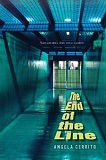
 The End of the Line
The End of the LineReviewed May 26, 2011.
Holiday House, New York, 2011. 213 pages.
Starred Review
Full disclosure: Angela Cerrito is my friend, and was a member of the Writer's Critique Group I was in at Sembach Base Library in Germany. In fact, I was very happy on the last page of the book to discover acknowledgements that included my name and our other friends from the writer's group, and even my dear co-worker at the library, Elfriede Moehlenbrock. (And then I remembered that Angela had asked me how to spell her name -- but it takes a long time after writing the acknowledgements for the book to actually appear in print.) I don't think I actually helped with this particular book, but like Angela, I am sure that when I get published some day, I will need to thank the many writers who critiqued and encouraged me along the way.
Before the main text of the book opens, we see these words:
If you kill someone, you are a piece of murdering scum. When I saw his body all twisted and still, I knew . . . I knew my life was worthless. It didn't matter what Dad said or how hard Mom cried. There was nothing they could do.
It didn't matter that my teachers tried to pretend nothing had changed when I went back to school. "Nice to see you," they cooed. But I could tell by the way their voices got squeaky that they didn't believe a word from their own lips. I could tell by the way their eyes swept over me quick. They looked at my feet or over the top of my head, because they didn't want to look into the eyes of a murderer.
Then, as the book begins, Robbie says, "They call this place Great Oaks School, but it must be a prison." Normally, I'd think a kid was exaggerating if they said that, but Robbie definitely has a point.
I guess my parents have finally given up on me. They've locked me up. I've been trapped in this room for hours, just me and a school desk with a stack of paper. That's all, except a yellow pencil making a blister on my finger.
A school official, Mr. Lester, comes in and tells Robbie to make a list telling who he is. When Robbie's list doesn't come up to Mr. Lester's standards, Robbie doesn't get any food.
Then the next short chapter takes us back in time to River Falls, the day Ryan, the new kid, showed up. He spent the first day actually under the desk next to Robbie. And then he followed Robbie home and ate dinner with his family.
The chapters alternate between Robbie's time in Great Oaks School or Prison with chapters about Robbie's normal life in River Falls. Great Oaks is the end of the line -- the school that will take kids no one else wants to deal with.
So what happened to get Robbie to this point? Angela Cerrito does a masterful job of weaving the two stories together. Mr. Lester wants Robbie to talk with the other kids at Great Oaks about what happened, and Robbie doesn't want to. Meanwhile, Robbie has what seems like a pretty normal life. Sure, Ryan does some strange things, but the more Robbie gets to know him, the more understandable it seems. And Ryan is great with Robbie's mom's daycare kids. And he even gets some of their classmates to come to Robbie's races.
In some ways, I was sorry I read this one so close to Okay for Now, by Gary B. Schmidt, because the two books felt very much alike. But instead of being historical, instead of having a close relative injured in the Vietnam War, Robbie has a close relative injured in the Iraq War, which feels much more immediate. Both books have a horribly unfair teacher, (So unfair, it makes me wonder if Angela drew him from life -- because that particular unfair bias just seems too bizarre to be anything but real!) but in The End of the Line, that teacher never does come around.
Another difference is that in Okay for Now, we know what Doug Swieteck's up against right from the start. We -- along with the whole town -- expect him to be a delinquent. In The End of the Line, Robbie seems like a great kid. What in the world happened to get him in this mess? Did he really murder someone? And why? As the book goes on, we feel like we understand more and more the anger and despair that are eating at Robbie.
I do love Angela's website, which dovetails nicely with the book. Since writing lists becomes important for Robbie, Angela offers readers a chance to submit their own lists. Who are you? Answer with a list.
Here's Robbie's list:
I am...
I am a person
I am hungry
I am a boy
I am 13 years old
I am a son, a grandson, a nephew
I am sick of this place
I am angry
I am thirsty
I am skinny
I am a runner
I am a killer murderer
